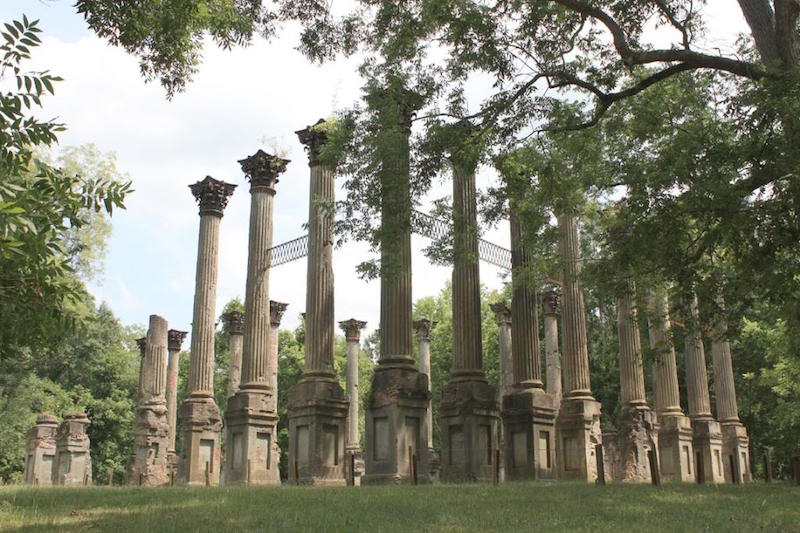Keeping a Record of War
Adie Kleckner
 A couple hours drive outside of Jackson, Mississippi, the Windsor ruins are all that remains of an antebellum home that survived the Civil War only to catch fire in 1890. The fire destroyed the original floor plans, photographs of the house, every brick baked and laid by the injustice of slavery. Even the original name of the plantation home is forgotten; Windsor refers to the sound of the wind passing through the trees and the pillars left to hold up the sky. The only record of the mansion’s appearance is a drawing by a Union officer, sketched while encamped on the grounds.
A couple hours drive outside of Jackson, Mississippi, the Windsor ruins are all that remains of an antebellum home that survived the Civil War only to catch fire in 1890. The fire destroyed the original floor plans, photographs of the house, every brick baked and laid by the injustice of slavery. Even the original name of the plantation home is forgotten; Windsor refers to the sound of the wind passing through the trees and the pillars left to hold up the sky. The only record of the mansion’s appearance is a drawing by a Union officer, sketched while encamped on the grounds.
Two years ago, both my brother and my boyfriend, Seth, deployed to Afghanistan. The flurry of their departure was like any departure—packing, good-bye dinners, delays, more good-bye dinners, and then the actual leaving itself, which was on a cold January day (Epiphany, actually) filled with wind and waiting. Like all departures, once the men had left, there wasn’t much to say. There was a lingering silence; all of our ears were ringing.
In static-ridden phone calls, my brother called from the FOB he was stationed at to tell me about the boredom of war, of lifting weights to kill time, of horse-riding Afghan officers with automatic weapons strapped to their backs, of bureaucratic horrors, and of a platoon member who shipped his entire drum set to the base so he could fill his free time with music. His deployment, it seemed, was filled with both excess and starvation.
While they were gone, I read about the war. Not newspapers—it was too risky, I didn’t want to stumble upon an account of violence they were witness or victim to—but fiction and poetry. I watched movies and documentaries. I looked at photography books.
In July 2014, The Guardian compiled a list of the top ten war poems. The list spans 1,000 years of poetry, but World War I poems are numerous on the list. World War I was the first time poetic voices from the trenches shed a light on the violence and ugliness of war:
Bent double, like old beggars under sacks, Knock-kneed, coughing like hags, we cursed through sludge, Till on the haunting flares we turned our backs, And towards our distant rest began to trudge. -Wilfred Owen, “Dulce Et Decorm Est”
There is no glory in this muddy war of trudging and waiting. The illusions of grander and the noble death of a hero are just that, illusions. But isn’t this trudging, this story of the soldier as victim of false hopes and someone else’s orders, also a Romanticized vision of war? Is it possible to write of war, of violence and death and waiting, without coloring the truth? How much of art is artifice?
Throughout Seth and my brother’s deployment, I mined their absence for material. Yes, as Flannery O’Conner wisely wrote, “I write because I don’t know what I think until I read what I say.” Much of my writing never made it to a final draft. But that’s only part of it. I returned to the page in hopes of unearthing the most human moment. I wanted to be awed. I wanted to feel. Isn’t war, that great equalizer of man, the best place to search out the searing moments of clarity?
Going back to the sketch of the Windsor ruins, I can’t help but wonder what art from this war will serve as the record of experience. Each war has a token literary voice—the poets of World War I, Joseph Heller and Eli Wiesel of World War II, Tim O’Brian and Ken Marlantes of Vietnam, the list is seemingly endless. We use the sum violence as our record. This war is no different: the photographs of Tim Hetherington, Phil Klay’s National Book Award winning short stories, the countless video games that allow the player to step behind the gun in fateful battles, Brian Turner’s poetry, all seek to give artifice to the truth of war.
In short, is our desire for a record feeding the fire? In giving violence an audience, are we creating a system that requires more violence? Do we do the pure an injustice by making the ugly beautiful? When have we written too much? And equally important, have we written too little?